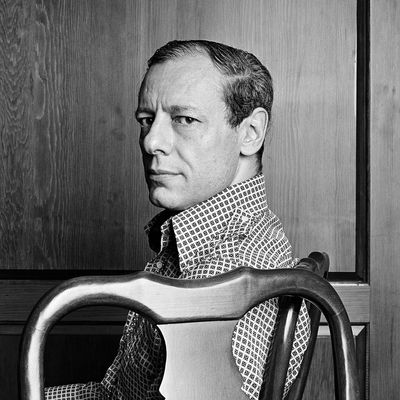
If you were a reader of New York magazine at any point before 2005, you had an opinion about John Simon. John — who died yesterday at 94, after a stroke — was New York’s drama critic for 36 years, from late 1968 to 2005, apart from a brief period when he moved over to covering film. (He also reviewed movies for many years at the National Review, and music and books for other outlets.) John was, in his prime, probably the most notorious critic alive. If the Times’s Frank Rich was the Butcher of Broadway, John Simon was its Hannibal Lecter. When he saw something he hated, he eviscerated it and ate its liver, and those meals were not infrequent.
Any of a thousand quotes from his reviews will give you the general flavor. “Don’t assume you have seen the worst before experiencing the latest revival of Jesus Christ Superstar, a production so stillborn I defy God himself to resurrect it.” Or his calling Anjelica Huston “supremely inept.” Or “When, some years ago, I saw Nilo Cruz’s Dancing on Her Knees at the Public, it felt like the worst play ever. Cruz’s latest, Two Sisters and a Piano, again at the Public, is a step forward; it feels like the second-worst play ever.”
The responses to his reviews were almost as legendary as the articles themselves. After he panned a Sylvia Miles performance, she saw him in a restaurant and dumped a plate of steak tartare over his head. Peter Bogdanovich, in the script for What’s Up, Doc?, named a pompous character “Hugh Simon.” The comedy duo Bob and Ray, after John panned their Broadway revue, added a character to their radio show whose name was John Simon, a.k.a. the Worst Person in the World, and he was always heard eating an enormous, sloppy sandwich. Most memorable, Simon played himself on an episode of The Odd Couple in which Felix and Oscar begin writing theater criticism and end up on a talk show alongside him. Predictably, John thinks their column is terrible; judging by the fragments that are read onscreen, I’m with him.
And he so enjoyed those fights. In the office, John used to do dramatic readings of his hate mail. His villainous reputation was almost surely enhanced by his Serbian accent, which gave him a certain vampire quality. Virtually everyone who ever wrote about John referred to him as “acerbic,” and he joked that “a Serb” had been turned into an adjective. He took special pleasure in an essay by the critic Robert Brustein that compared him with a book editor of the same name and categorized them as Good John Simon and Bad John Simon. This John enjoyed being the Bad One.
He was not, in doing so, merely expressing the benign grumpiness of the charming curmudgeon. John Simon wrote things that would be unpublishable today and not because we have become oversensitive. They are unacceptable because, for example, nobody should ever call a show “faggot nonsense,” or say of Barbra Streisand that she is “the sort of thing that starts pogroms,” or say, at intermission during an Off Broadway show in 1985, “Gays in the theater! I can’t wait till AIDS gets all of them!” (That last one was the rare remark for which he issued a public apology.) He once dismissed a Tony nomination for a musical’s book by Melvin Van Peebles by saying, “Clearly, if it hadn’t been a little black book, it wouldn’t have had a Chinaman’s chance.”
Long after the argument about nontraditional casting had been settled, John continued to argue his position, saying that casting (for example) black actors in roles originally written for white people was distracting and inappropriate. When pressed on this subject, John often deployed a straw-man argument along the lines of, Well, appearances and beauty matter onstage, especially in women. Would you cast James Coco as Romeo? He was inarguably, misogynistically extra-hard on actresses, dwelling on their looks. The roll call of insults in his reviews (to Streisand, to Elizabeth Taylor, to Liza Minnelli) is well known.
Those views are not defensible, and I do not intend to defend them. The pungency of his opinions, though, could have some value, in part because when he liked something, it was usually pretty great. When he did not — and when he could see past the worldviews described above — he often still fulfilled the primary function of the critic: getting you to consider why you responded to something the way you did. That was true even in inadvertent ways. The critic Joseph Epstein said that agreeing with one of John’s reviews was cause to “instantly want to reconsider one’s own position.”
Bogdanovich once called John “pseudo-intellectual,” but the “pseudo” part of that is wrong. John was extremely learned, comfortable in half a dozen languages, better read than almost anyone I’ve met. He grew up in Subotica before the Second World War and came here as a child, then pursued three degrees — B.A., M.A., Ph.D. — at Harvard. Perhaps because English was not his first language, he was relentless about correct grammar and usage, and his book Paradigms Lost is about his view of the declining standards thereof. I was John’s final day-to-day editor at New York, although I was not expected to edit John in any traditional sense; I mostly kept an eye out for his worst instincts and tried to coax him into a less offensive line of thinking. After he was fired in 2005, I’d see him at the theater regularly, and he was cordial.
His opinions could also be surprising. In 1982, John went surprisingly easy on Cats, which is to say he didn’t exactly like the show but took it on its own terms and found it amiable. He flat-out shocked several of us — and, judging by the tone of the review, himself — when he loved Yoko Ono’s memoir-musical New York Rock. He had a soft spot for a certain kind of romanticism — European art songs, for example. He could be funny, too. His very first piece for New York was a bravura defense of booing.
And let’s be fair: A lot of readers loved reading Bad John Simon because a brutal pan, when it’s not about you or your show or your spouse, can be delicious. Today — and don’t misunderstand me; I think this is a good thing — we tend to reserve the big takedowns for big targets. In a time of fewer outlets for criticism, especially for books and theater and classical music, there’s a feeling that we should concentrate on examining stuff that’s hyped or overrated or causing harm in the world and leave the rest to fade into obscurity. In John’s prime, the world of criticism was considerably larger than it is now, diluting any one opinion. An editor friend once suggested to me that he was better employed as a film critic because the larger pool meant that he “could do less damage.” Perhaps proving the point, when he briefly stepped over to the film beat for us, he memorably panned Star Wars in 1977, and the movie did okay without his approval. (We reposted that review in 2015, appending new annotations by the man himself.)
One other thing is worth noting about John: his relentless tenacity. After he was fired from New York in 2005, he briefly settled at Bloomberg News, then at the weekly Westchester Guardian, and finally on his own blog. Even after reaching the point where he had no paying outlet, he kept at it, continually trying to express himself interestingly and forcefully. That is the part of John Simon’s career worth emulating. I don’t think it’s cruel to say this, because John himself would undoubtedly have turned it into a gleeful anecdote: When he had the stroke that killed him, he was at a local dinner theater. Hell of a review.





